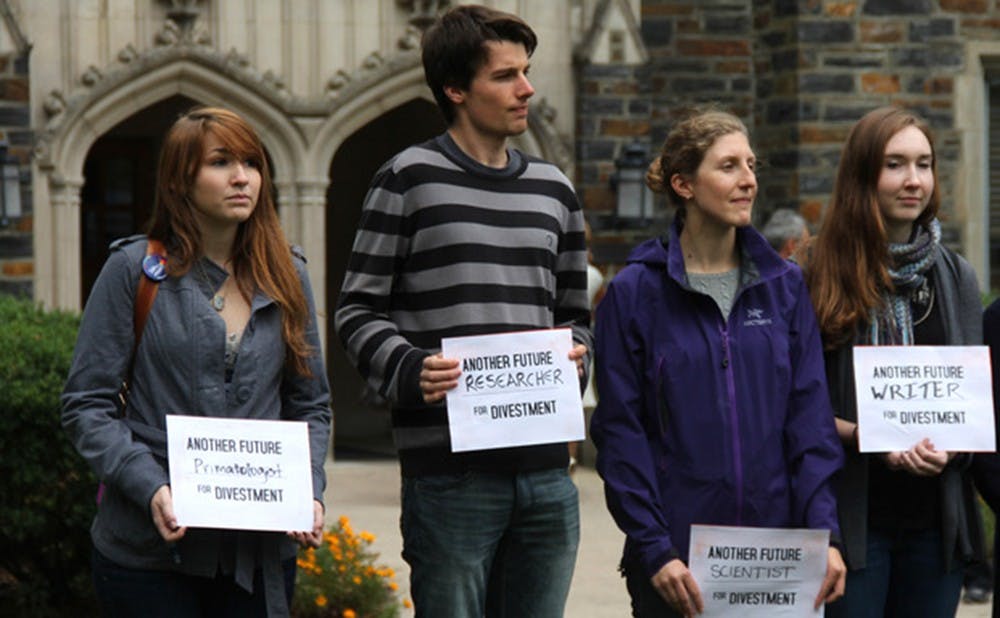The Duke administration announced its rejection of a student-driven proposal to divest the University from fossil fuels.
The announcement was handed down Tuesday, after the Advisory Committee on Investment Responsibility—a group comprising faculty, students and alumni designed to assess the social impact of Duke's investment—unanimously recommended against divestment in a letter to President Richard Brodhead dated Nov. 24, 2014.
Brodhead stated his support for the ACIR’s decision Tuesday in a letter addressed to members of Divest Duke—the student group that urged the University to remove its investments in the top-200 publicly-traded companies that hold a majority of the world's coal, oil and natural gas resources.
“The ACIR and I share your deep concern regarding human-induced climate change and the disruptions it poses to the human and natural worlds,” Brodhead wrote. “At the end, however, the ACIR does not recommend divestiture from fossil fuel companies at this time on the terms proposed.”
The committee cited lack of sufficient discourse on the issue and uncertainty about the impact of divestment as primary causes of concern. It also noted that companies had not been given the "reasonable opportunity to alter their activities" required by Trustee guidelines.
The committee recognized the symbolic value that divestment would have but highlighted the importance of action, focusing on the tangible ways Duke has acted to mitigate the effects of global warming—including investing millions to convert the University’s boilers to natural gas, committing to be carbon neutral by 2024 and supporting natural gas and electric busses.
The committee also made a series of recommendations—suggesting that DUMAC make annual reports to the ACIR on its fossil fuel energy and clean energy holdings, make targeted investments to advance clean energy and implement policies to support the reduction of carbon emissions.
"Duke is a place of engagement and exploration, but also action," said ACIR Chair James Cox, a Brainerd Currie professor of law. "We believe our report, and especially the recommendations we made, reflect those values. At the end of the day, we all felt good about having our names associated with it."
Following Brodhead's announcement, Divest Duke members described their disappointment in the University's decision in a public statement.
The statement offered a number of counterarguments to reasons cited by the ACIR for its decision. It noted that, although the ACIR listed lack of community engagement in the discussion as a concern, Divest Duke has held "well-attended panel discussions including Duke faculty and has collected over 3,500 petition signatures from students, gathered 100 faculty support signatures and, in a single day, garnered 250 alumni and student calls to the President’s office in support of divestment."
"Show us a group on campus that has the same level of community dialogue," the group's statement reads.
Divest Duke also noted that the ACIR's letter seemed to frame the University as having to choose between making a symbolic gesture by divesting or taking action by reducing its carbon footprint.
"This is not an either-or scenario—we welcome changes that make our university more sustainable," the statement says. "Divestment is a logical and simple next step which complements our current on-campus actions."
Divest Duke's statement also declared it impractical to wait for fossil fuel companies to change their policies—asserting that fossil fuel companies "simply cannot and will not adapt in the ways that are necessary to fight climate change."
Members concluded their statement by encouraging students to make their voices heard and join the movement.
"If our University will not act on climate change, then the students must—we challenge our fellow students to continue to raise awareness and take action on climate change," the statement reads.
Get The Chronicle straight to your inbox
Signup for our weekly newsletter. Cancel at any time.

